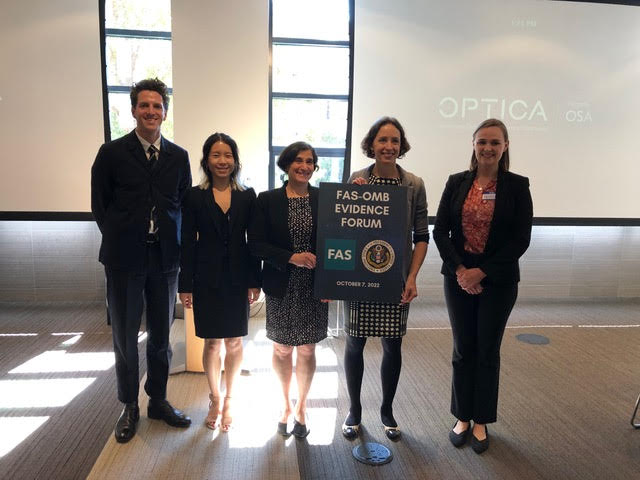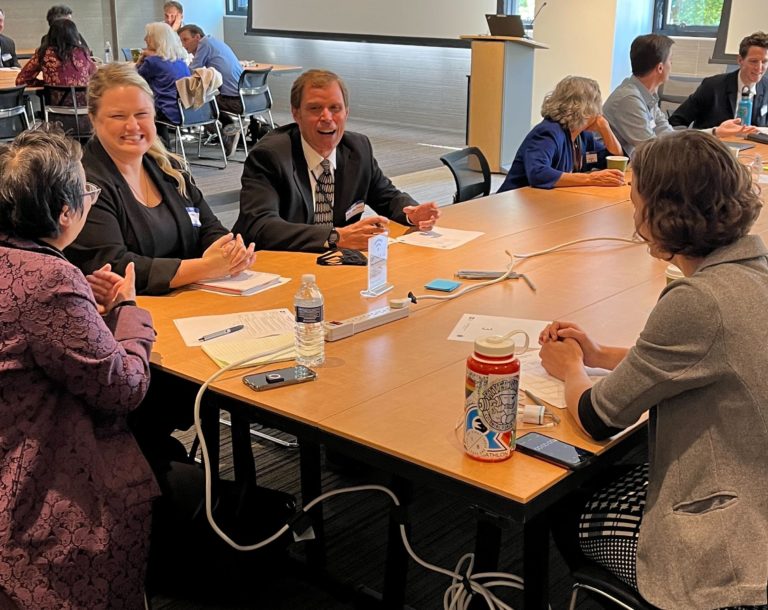The FAS-OMB Evidence Forum: Thinking Back and Looking Forward
Until a month ago, I was an event skeptic.
When it’s as easy as a Zoom link to connect with colleagues, I found it hard to believe that getting a bunch of people together around an agenda was ever really worth the time and effort.
Point one for my colleagues at FAS and the White House Office of Management and Budget (OMB), who thought that co-hosting an “Evidence Forum” in support of the White House Year of Evidence for Action was a good idea. And were completely right.
The FAS-OMB Evidence Forum, a half-day session in Washington, DC on October 7, 2022, proved that events can indeed drive forward progress when they include three key components: compelling ideas, effective champions, and an open structure that enables participants to identify intersections with their own work. Let’s touch on each of these in the context of the Evidence Forum.

Compelling ideas
The Evidence Forum showcased four novel proposals for enhancing evidence-based policy and practice across federal government. Three of these ideas were developed through the “Evidence for Action Challenge” co-sponsored by FAS and the Pew Charitable Trusts Evidence Project. These ideas were:
- Incorporating evidence on what the public values into policymaking. For instance, public willingness to embrace various forms of climate-adaptation strategies can and should be considered alongside expert assessments when designing climate action plans.
- Using unmet desire surveys to facilitate productive collaboration among federal agency staff and external experts. Such surveys could, in particular, identify where federal staff could use help from others in advancing agency learning agendas.
- Launching an intergovernmental research and evaluation consortium focused on economic mobility. By linking datasets and creating reusable evaluation templates, such a consortium could enable cheap, fast, and reliable assessments of various economic programs.
A fourth idea also shared at the Forum was incorporating Living Evidence into federal initiatives. While traditional approaches to knowledge synthesis are often static and can quickly go out of date in rapidly evolving fields, Living Evidence uses thoughtfully designed, dynamic methodologies to produce knowledge summaries that are always current. This is especially important for topics where new research evidence is emerging rapidly, current evidence is uncertain, and new research might change policy or practice.
Effective champions
The Forum demonstrated how much more powerful ideas on paper become when articulated by someone who can give those ideas dimensionality and life. In an armchair discussion, Drs. Julian Elliott (Monash University) and Arlene Bierman (U.S. Agency for Healthcare Research and Quality) emphasized that Living Evidence is not a theoretical construct—it is already informing dynamic COVID-19 clinical-practice guidelines and shedding light on plant-based treatments as an alternative pain-management approach. Similarly, Kathy Stack (Yale University) drew on her extensive past experience at OMB to illustrate why intergovernmental partnerships are crucial for improving evaluation and delivery of programs that serve overlapping populations.
The Forum elevated newer voices as well. Postdoctoral research associate Nich Weller (Arizona State University) argued that while federal evidence efforts acknowledge the importance of social, cultural and Indigenous knowledge, they do not draw adequate attention to the challenges of generating, operationalizing, and integrating such evidence in routine policy and decision making. Nich laid out a vision for a federal evidence enterprise that would incorporate the living and lived experiences, knowledge, and values of the public alongside scientific findings and expert analysis. Associate Professor Adam Levine (Johns Hopkins University) also emphasized that effective evidence-based policy depends on interpersonal connections. As Adam explained,
The issue isn’t simply that strangers do not know each other—it’s also that strangers do not always know how to talk to one another.
Intentionally addressing this reality is essential to cultivating productive working relationships.
Open structure
We’ve all been to events where you get talked at for a few hours, then leave and continue on with your day. The FAS-OMB Evidence Forum broke this mold by providing opportunities for interactive Q&A throughout the first portion of the agenda—and then dedicating the second portion to an open ideation session that encouraged attendees to brainstorm how Living Evidence could be applied in their home institutions.
Once a lighthearted icebreaker question (“What is your favorite pasta shape and why?”) got creative juices flowing, the ideas came fast and furious. Working collaboratively first in pairs, then in small groups, and finally altogether, participants ultimately honed in on four pressing policy questions that Living Evidence could help answer:
- What types of stakeholder engagement strategies are most effective?
- How do various social determinants of health affect health outcomes?
- When should those suffering from long COVID be deemed eligible for disability benefits?
- How can government bridge local knowledge and academic research on climate adaptation strategies?
Participants also worked together to outline specific components that could be included in Living Evidence research agendas for each of these questions and defined criteria for success.

Looking ahead
A lot of great stuff happened during the Forum itself. But I’ve been even more excited to witness the follow-on in the weeks since. Motivated by the Forum, agencies are already taking concrete steps to scope intergovernmental research and evaluation consortia for other policy domains, update existing surveys with unmet desire questions, reframe public values as empirical evidence, and consider what support and guidance is needed to position Living Evidence as a standard component of the federal evaluation toolkit.
And I am confident that, in what remains of the White House Year of Evidence and thereafter, much more exciting work is to come. To echo the words of Sir Jeremy Farrar (Wellcome) during his Evidence Forum keynote address,
This is the moment for us to grasp—not in fear, not in uncertainty, not to be down beaten by the challenges the world faces at the moment. But to say that we actually can make the world a better place.
How could anyone be skeptical of that?
Missed the Forum? A full recording can be accessed here, using the passcode vm6?$rK%
See this whitepaper recapping the event in more detail for additional policy recommendations.
The transition to a clean energy future and diversified sources of energy requires a fundamental shift in how we produce and consume energy across all sectors of the U.S. economy.
Advancing the U.S. leadership in emerging biotechnology is a strategic imperative, one that will shape regional development within the U.S., economic competitiveness abroad, and our national security for decades to come.
Inconsistent metrics and opaque reporting make future AI power‑demand estimates extremely uncertain, leaving grid planners in the dark and climate targets on the line
As AI becomes more capable and integrated throughout the United States economy, its growing demand for energy, water, land, and raw materials is driving significant economic and environmental costs, from increased air pollution to higher costs for ratepayers.